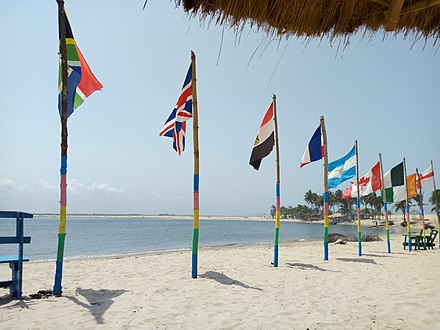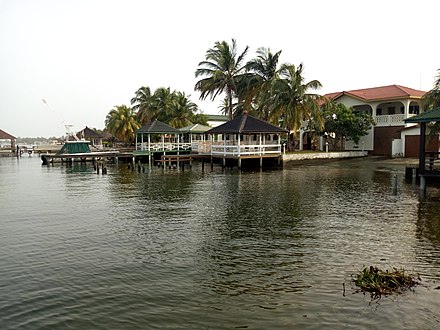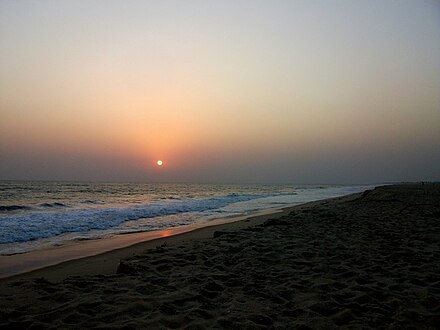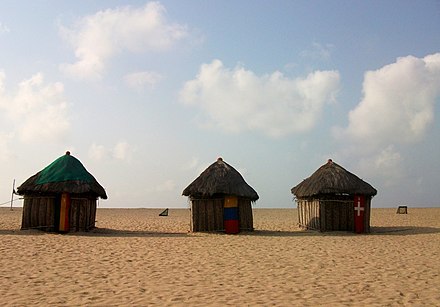Ada (Ghana) - human settlement
Ada is an area in the Dangme East District that is in the eastern part of the Greater Accra Region in the southeast of Ghana. It is comprised principally of the "towns" of Ada Foah, Big Ada, and Ada Kasseh. Ada Foah, which is also the district capital, is located at the beach and river estuary, and naturally is where most visitors spend their time.
Understand
The district's coconut palm fringed coastline is 45 kilometers long and provides a living to many people that are employed in fishing and fish processing. However, this coastline is constantly being eroded by the strong tidal waves that are washing away or threatening several villages that are located close to the beach. In order to solve this problem, the construction of a sea defense wall is under way since 2010.

Apart from the sandy beaches, another natural attraction in the district is the Volta River and its estuary. The Volta River forms the eastern boundary of the district before it reaches the Gulf of Guinea. The islands in the river and in the estuary are a wildlife paradise: marine turtles, birds, crocodiles and monkeys are some of the animals living there. The mangrove vegetation in the salty parts of the estuary is another attraction and an important ecosystem. It is however endangered by human activity along with rare animals that are often hunted down.
The estuary also offers the best conditions for water sports like sailing, canoeing, fishing, water skiing, wake boarding and jet skiing.
Another important water body and one of the most important salt mining areas in the country is the Songor Lagoon. Additional to visiting it and learning about salt mining it serves as a base for birdwatchers.



Talk
Most of the inhabitants (85.9 %) belong to the Dangme Tribe. The local language in the Dangme East and West District is Dangme, also called Adangme. It is a Kwa language and is spoken by around 800,000 people in the Dangme East, Dangme West, Volta Region and Togo. They are part of the Ga-Dangbe ancestral lineage. The Dangme speak und understand Ga Language as it is similar to Dangme. English is also spoken by nearly everyone since it is the official language of the country. Many people also speak some Ewe (to communicate with the neighboring people of the Volta Region, Togo and Benin) or Twi.
Get in
The best way to get to Ada is by Tro-Tro (small bus), taxi, your own or a rental car.
From Accra: there is a regular connection (1½ to 2½ hours, about 120 km) from Tudu Station or from Tema Roundabout. Some Tro-Tros go directly to Ada Foah, with others you have to change in Ada Kasseh. The usual times of operation are between 04:30 and 21:30, but can vary according to the day of the week.
From Aflao:take a Tro-Tro in the direction to Accra and get off at Ada Kasseh (3-4 hours, about 80 km).
You can also get there by ferry from the Volta Region (Anyanui). It only operates on Wednesdays and leaves Anyanui at around 13:00 and 18:00 and takes about 1½ hours. It departs in Ada Foah around 08:00 and 15:00.
Get around
Taxis are readily available, either by car or by motorcycle. Even though motorcycles are not officially allowed to operate as taxis, it is a very common and affordable means of transport. And it can bring you to faraway places that don't seem to be accessible with any vehicle. Just stand at the street and stop a passing one. You can also ask your guesthouse or the Tourist Information Center to book one for you.
The best way to get around is the ever present Tro-Tro (small bus). It's easy to get around with a reagular connection between Ada Foah and Kasseh (about 20 km).
If you feel like taking the water route, consider joining the ferry to the market in Anyanui on Wednesdays. This is a very fun way of getting to the other side of the Volta River with a big crowd of locals who bring their products to the market. The ferry leaves Ada Foah around 08:00 and 15:00 and returns from Anyanui around 13:00 and 18:00. It takes about 1½ hours one way. These are only approximate times - in general, the ferry operates similar to the Tro-Tro: it leaves when it's full.
The Estuary Beach camps are a little harder to reach. The typical way is to grab a motor canoe from virtually any beach on the bayside, with the closest, cheapest option being from the end of the taxi-passable road at the entrance to Azazanyi Village. You can do the sandy 30-minute walk through Azazanyi too, with the most direct (and lightest hassle) route being along the oceanside beach.
See
-
Community zoo. Samuel Kabutey Kabo caught his first snake when he built a well some years ago. He went to town to get some supplies and accidentally ran over a cobra with his bike. The snake got very angry and followed him back to his house where it fell into the half-finished well. Samuel's first instinct was to kill the snake, but the Wildlife Division told him that he should keep it and show it to the people to educate them about local animals. That is how the community zoo started. After the Cobra Samuel also caught some pythons and crocodiles that can all be visited at the zoo.
-
Crocodile Island. There used to be a great number of crocodiles living on one of the islands in the river. But increased human activities drove them away. All that is left nowadays are two or three crocodiles living in a small walled cage on Pediatorkope island. There is no tour to visit them, but any boat operator will take you there if you want or just rent a canoe and paddle there yourself.
-
Fetish shrines. Shrines are part of daily life in Ghana. The two major shrines in Big Ada were closely connected to Trokosi, or girl child slavery. In this traditional perception, a crime is atoned for when a girl of the offender's family is send to a shrine to serve the gods. This can be for months, but also for many years. Although this practice was legally abolished in 1998, there are still some groups who want to hold on to this tradition. Other opposing groups on the other hand have put much effort into the liberation of the girls and their education and reintegration into society. In Big Ada, Dasume Shrine and Dada Shrine (also called Ogbekpe) can be visited. There is another big one in Goi, one on the island of Alorkpem and one on the other side of the Volta in Anyanui.
-
Fetish priests. Every shrine has its priest who takes care of it and worships the gods in it. So naturally, there is a great number of shrines in the district – most of which can also be visited. Many priests have special healing abilities, do spiritual ceremonies and are consulted for any kind of problem from sicknesses to family problems, unemployment or bad luck.
-
Fishing. Building traditional fishing boats requires much work and is very expensive. The lower part of the boat is made of one big piece of wood, the upper part of planks. All the boats are then painted in many colors with religious sayings written on it. There are many fishing villages around, the bigger ones being Akplabana and Pute.
-
Monkey Island. You have to get up early to see the monkeys on so called "Monkey Island" in the Volta River. During the day they stay away from the villages and retreat far into the woods, but if you manage to arrive around 06:30 you can watch them from one of the watchtowers that were built for this purpose.
- Old trading fort at the seaside. Only few people know where Ada Foah has got its name from. The reason is the fort near the Presbyterian Church that gave the town its name to distinguish the two Adas: Ada Fort, village of the fort. As the sea comes closer more than 1.5 meters each year, it is gradually washing the building that once used to be a prison into the ocean. Half of it is already eroded but hopefully the upcoming construction of the sea defence wall will stop this progress.
- Ostrich Farm. If you want to see some really big birds go to Dedukope Ostrich Farm, located close to the border of the Dangme East District. They have some hundred ostriches living in enclosures whose meat is sold to restaurants. You can walk along the enclosures and have a look at the giant eggs. It's a bit difficult to get there, there is no established tour so far and the only information you get is from the watchman or the taxi driver (a small tip is appreciated for the visit).
- Presbyterian church and missionary cemetery. When looking at the Presbyterian Church in Ada Foah you will be aware that it is a missionary church built by the first generation of Ghanaian Christians at around 1890. When the European missionaries came to Ghana in the 19th century they faced harsh conditions that they were not adapted to. Many died very young of various tropical diseases. These missionaries were buried at the cemetery next to the Presbyterian Church in Ada Foah.
- Sacred Woods. In traditional belief, walking into a sacred wood can turn that person into an animal or he or she might vanish and never return. There are about 20 sacred forests in a near Big Ada which are believed to house deities that are worshiped by people with traditional beliefs. Officially, these forests are only allowed to be entered by people of traditional beliefs and are mostly feared by all others.
- Songor lagoon. Visit the Songor Lagoon, the biggest natural salt mining area in Ghana; only about 15 minutes drive from Ada. At this communal salt field you can watch locals at all stages of salt production: from inducing salt water from the ocean into the pans, the crystallization when it dries to washing and packing the salt into bags and loading them unto trucks. Apart from watching the salt mining activities, it is also an excellent place for watching the wintering European birds. The Wildlife Division has put up some observation towers and offers guided tours to the sight.
Do
- Asafotufiami Festival. Historically, the Asafotufiami is a remembrance of ancient wars with neighboring tribes. The "Asafotu" are companies of warriors who fire their muskets in celebration. These days, the festival is a grand homecoming for the Ada diaspora. The celebration starts on Thursday in the first week of August and goes on until the following week. The days are filled with celebrations, traditional ceremonies, beach parties, boat races, river excursions and football matches.
- Bird watching. The Songor lagoon is an area of international importance as it hosts thousands of migratory European birds wintering in Ghana. The lagoon provides feeding, breeding and resting ground for over nearly one hundred migrant and local birds. The best time to watch birds is towards the dry season (August to February) – the European winter, and in the early morning or late afternoon.
- Boat race. A boat race can be witnessed on the river near the estuary every year in December. Paddle boats for 5 or 15 people compete against each other. Visitors can watch the race and also participate if they register as a group about a week in advance.
- Church. The majority of the Ghanaians are Christians and religion is very present in everyday life. Signs of this are many religious shop names such as “God is great” or “Fear God” and the enormous number of churches in every town and village. The majority of people go to church on Sunday and visitors are always welcome to join.
- Funerals. Funerals are part of everyday life and it is common to see people walking around in the mourning colors black, white and red on weekends. The celebration follows a strict schedule: On Friday the corpse is brought to the family house accompanied by songs of brass bands and the ceremony starts. On Saturday the corpse is buried accompanied by drumming and music before and after the burial. Throughout the whole ceremony, the sympathizers are expected to make a contribution that is noted precisely. On Sunday, the guests attend a thanksgiving church service in memory of the deceased in case it is a Christian funeral and give thanks. If it is a traditional funeral, the ceremony is continued until the afternoon when the guests depart.
- Monthly Beach Soccer event. There is a beach soccer tournament on the first weekend of each month at the seaside near the estuary where teams from different communities in the district compete against each other. Before the start of the tournament the beach is cleaned which is the underlying intention of the whole event.
- Monthly symposium. Once a month the ferry that operates between Ada Foah and Anyanui turns into an event location. This unusual venue hosts a monthly symposium that informs both locals and tourists about specific topics concerning health, tradition and education. For the current topics, ticket purchase and the exact dates please contact the Tourist Information Center.
- Sea turtle watching. Every year from August to February the Leatherback turtle, Green turtle and Olive Ridley turtle lay their eggs at the seashore. The main nesting areas are the islands/sandspit between the two estuaries and beaches westward of the estuary. Visitors can witness this fascinating sight of the huge turtles coming out of the water and nesting in the sand. Night tours are organized by the Wildlife Division.
Buy
-
Coffins. Ever thought about being buried in a tomato? Or maybe a truck? Although the majority of the Ghanaians are buried in normal ones, there are some carpenters that have specialized in building eccentric coffins. All are made for order and can be any shape you can imagine, from fish, canoes and Tro-Tros to sewing machines, pepperoni, tomatoes and books. The shape of the coffin is always connected to the life or profession of the deceased, so a fisherman would be buried in a fish or canoe, a teacher in a book and a farmer in a tomato.
-
Markets There is a big market in Kasseh on Tuesdays and Fridays where you can get just about anything you can imagine. From Ada Foah take the Tro-Tro in the direction of Accra and get off at the market place at Kasseh. A smaller market in Ada Foah on Wednesdays and Saturdays is good for buying fresh vegetables and seafood and some smaller supplies. The Wednesday market in Anyanui is small but less chaotic than the one in Kasseh. You can combine a market visit in Anyanui with a ferry tour. Leave Ada Foah at 08:00 and witness how the sellers already start their business on The ferry. It will return to Ada Foah at around 15:00, always depending on when the ferry is full.
-
Rum factory. Ebenezer from Aflive calls his island the "rum island". His sugar cane distillery and the produced "Igo-gro" (from "I go - I grow") has gained quite some fame and people come from faraway places to stock up on his homemade rum.
-
Tailors. The rattling of sewing machines can be heard everywhere around the towns and most people have their clothes sewn there instead of buying manufactured clothes. There are sewers for women’s, men’s and children’s clothes and special sewers for school uniforms. So just get yourself some colorful fabric at the market, choose a design from the pictures and order for a custom-made dress or shirt.
Traditional handicrafts
- Basket weaving. Weaving palm leaves into baskets, rope or mats for sleeping is a widespread local activity. Palm leaves are collected, cut and woven into ropes. Those ropes are used for typing straw mats or any other thing and are very durable. On many islands in the river (especially Aflive and Alorkpem) visitors can watch the women and men weaving and also try it out for themselves.
- Pottery. The Vume Pottery Cooperation, located in the Volta Region close to the border to Dangme East draws clients from faraway places to buy it there. Visitors can buy the locally produced vases and pots, watch the men and women work on the potter's wheel and with their hands and try it out themselves.

Eat
Drink
Sleep
Connect
Go next
- Island Tour: Join a boat tour on the river around the islands. Visit the rum factory to try some locally produced Akpeteshi, take part in the basket weaving and stop over at the estuary on the way back. You can decide to spend the night in one of the beach camps at the estuary, walk back to Ada Foah through the villages or go back by boat.
- Songor Lagoon: Visit the salt mining activities at the Songor lagoon and learn how the salt is locally mined and processed. If you like, you can join a bird watching tour by the Wildlife Division either before or after the visit. The tours to watch the migratory European birds only take place in the early morning or late afternoon.
- Turtle Tour: Join a night turtle tour along the beach with the Wildlife Division. You will be walking or driving along the beach searching for sea turtles that come to the shore to nest. It is allowed to come close to watch while they lay and hide their eggs.
- Wildlife Island Tour: In the early morning, take a boat to the monkey island. If you are lucky, you will spot some of them from one of the watchtowers. After your visit, do a boat cruise along the Volta River and consider a stop-over at the crocodile island.
- Local Tradition Tour: Do a tour to one of the shrines where you can meet a fetish priest and learn more about traditional religion. Later, visit one of the sacred groves around the towns and find out about the history. For this tour you should contact the Tourist Information Center that will arrange your visit and tell you about what to keep in mind before visiting these traditional sites.
- Asafotufiami Festival: Take part in one of the Asafotufiami festival days in August, one of the biggest festivals in the region. There are processions, speeches and celebrations in which you can take part. Check on "Dates and Events" about the current dates.
- Old Fort and Fishing Villages Tour :Visit the old fort in Ada Foah that is partly washed into the sea and the Presbyterian church with the old missionary cemetery. Then do a tour to one of the fishing villages along the coast and see how they fish with nets, distribute the fish and process it by smoking.
- Local Handicraft Tour : Visit the pottery village in Vume and the coffin makers in Sege. After you had a good look at the handicraft produce or bought something visit the market in Kasseh on your way back.
- Traditional Ceremony Tour:Start the weekend with a visit of the traditional drumming at the Fetish Priest's shrine in Anyanui on Friday. You can spend the night in the shrine or stay overnight at the Africa Home Lodge in Anyanui. On Saturday and Sunday, visit a funeral and go to a church service. On any other day, you check at the Tourist Information if there are child naming ceremony taking place.
Ada Foah
Date Time:Please wait...Timezone:Africa/AccraCoordinates:5.80, 0.62
Greater Accra
Primary administrative division


